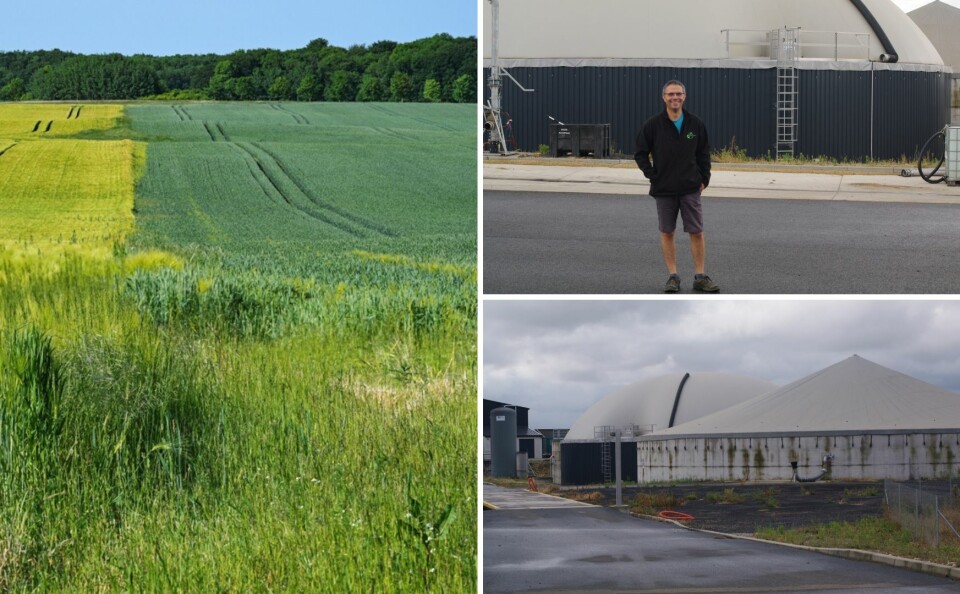-
‘It’s becoming intolerable’: homeowners in France move north to escape the heat
Heatwaves becoming more regular and intense
-
More communes in France distribute Asian hornet traps
Residents are increasingly receiving help, with now the best time to capture the queens
-
New farmer protests this week - where and what to expect
Pressure mounts on the government over agricultural policy, disease control and trade agreements
Farmers boost France’s gas independence with small methane plant
A methane plant near Poitiers produces enough gas from farmers’ cover crops to run most of the city’s bus fleet

Aiming for gas independence and reduced CO2 emissions could result in more methane plants in France over the next decade.
Methane is the primary component of natural gas but it can be produced in a renewable way from the decomposition of organic materials.
Logical to make methane from by-product cover crops
One of the newest methane plants, an €8million set-up just outside Poitiers in Vienne, produces enough gas from farmers’ cover crops to run most of the city’s bus fleet.
Cover crops are planted in autumn to stop bare soil washing away and are now compulsory in France.
In this case, rye is mainly used. It is harvested green in the spring, before the fields are planted with sunflowers or maize.
Cédric Abonneau, president of SAS Migne Biomethane, which runs the Poitiers plant, said: “A group of farmers, all faced with environmental problems, thought there must be a way of contributing.
“Using cover plants, which would otherwise be difficult to manage, to make gas seemed the most logical.”
Read more: Biogas: French town converts fallen leaves into energy
Organic waste from restaurants and breweries
The company was formed in 2017, but it took two-and-a-half years for planning permissions to be granted and another year for building work to be completed. It finally started operating last year.
Mr Abonneau said it will take around 15 years for the farmers to pay off the cost of the plant, depending on the price of gas.
Some help has come from state and local government agencies, and the original farmers were also joined by two farming co-operatives.
As well as rye, the methane plant takes manure from horse stables and organic waste from restaurants and canteens in the Poitiers area.
It can handle everything except large bones and shellfish shells. Dregs from breweries also go into the mix.
The canteens, restaurants and breweries pay a local company to collect their sorted bins, which is less costly than getting it taken away for composting.
Faint sour milk smell from the fermenter
Some plants in France have stirred up opposition from locals because of smells and the traffic generated by deliveries.
Migne Biomethane has largely avoided this because deliveries are on wide departmental roads and the bulk rye drop-offs are done in farmers’ tractors and trailers, which people are used to seeing on the roads.
The plant is 900 metres from the nearest houses, and the firm claims hardly any smell escapes the three-hectare site.
When The Connexion visited, there was just a faint sour milk smell from the fermenter and dried residue, but nothing unpleasant.
70% less CO2 than imported fossil fuel gas
Eric Primault, a local government co-ordinator for Gaz Réseau Distribution France (GRDF), the state-owned gas infrastructure, said the main criteria for siting new plants will be how close they are to existing gas networks.
“Joining the pipe from the plant to the gas network is expensive, so the closer the better,” he said. “But they should also be a distance away from houses and have good road access.”
As well as cereal-fed gas plants, there are methane plants near pork farms in Brittany and some dairy farms, and others run by poultry producers in the south west.
By-products from the process include a dry compost-like material, which is spread on the fields the rye was grown in, and a liquid fertiliser, which is injected into soil in a similar way to cow waste – but with a lot less odour.
Mr Primault said methane from the plants produced at least 70% less CO2 than imported fossil fuel gas, because it is captured by the crops growing the next season to make it.
Gas is still needed as part of fuel mix
“France will need gas for the foreseeable future and our goal is to reduce the CO2 footprint as much as possible,” he said.
The government banned gas boilers in new-build homes from January 1, 2022, in a drive to reduce carbon emissions, with heat pumps cited as the recommended replacement.
However, it has dropped the plans for a blanket ban and, at least for now, households are still permitted to replace their old gas boiler with a new one.
Read more: What has led to France’s u-turn over gas boiler ban?
“The country needs a mix of energy sources, and gas is a key part of that,” added Mr Primault.
“Logically, we should produce it as close to use as possible and in as environmentally friendly a way as possible, and plants like this one are the way we can do it.”
Related articles
‘Cut your cow numbers to help meet climate commitments’, France told
























